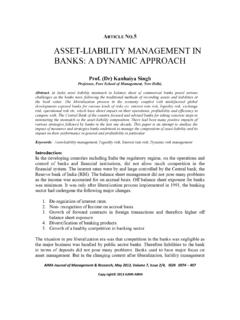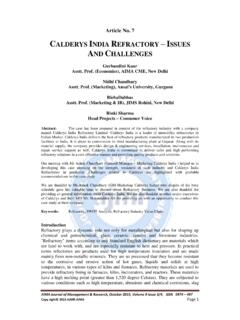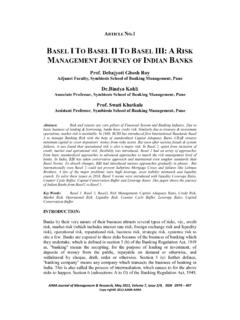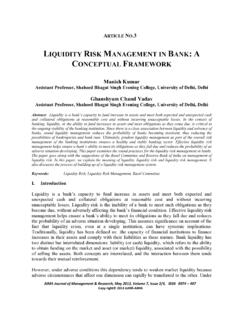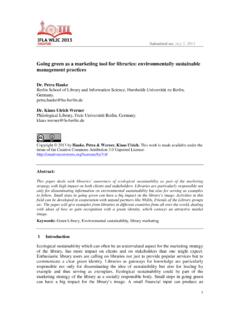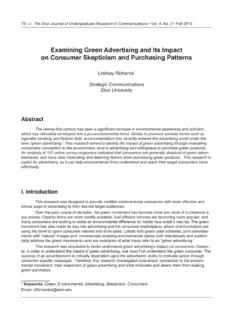Transcription of AWARENESS OF GREEN MARKETING AND ITS I BUYING …
1 AIMA Journal of Management & Research, February 2014, Volume 8 Issue 1/4, ISSN 0974 497 Copy right 2014 AJMR-AIMA ARTICLE AWARENESS OF GREEN MARKETING AND ITS INFLUENCE ON BUYING BEHAVIOR OF CONSUMERS: SPECIAL REFERENCE TO MADHYA PRADESH, INDIA Dr. Shruti P Maheshwari Assistant Professor, Shri Vaishnav Institute of Management, Indore, MP, India Abstract: Customer s attitudes are changing towards the environment to encourage innovation for conservation and the benefits from this source of innovation are certain to outlive our current generation. This paper investigates consumer beliefs and attitude on environment protection and their purchasing behavior of eco-friendly products. This paper also focuses on the success of efforts put by marketers in bringing GREEN brands AWARENESS in consumer s mind. It further reviews consumer behavior and impact of MARKETING communication to identify how consumers are persuaded to opt for greener products.
2 It reports the results of a consumer product survey using a questionnaire based on the Dunlap and Van Liere HEP-NEP environmental survey and the Roper Starch Worldwide environmental behavior survey. This paper identifies that consumers are not exposed enough to GREEN product MARKETING communication and suggests the greater use of MARKETING and brands to promote and sell products that are environmentally friendly and function effectively. The paper suggests that the Indian market for greener products could be exploited more within consumer groups that have pro environmental values. Keywords: GREEN MARKETING , Customer s Belief and Trust, Consumer s AWARENESS , GREEN Brands, HEP-NEP environmental survey. Introduction The GREEN movement has been expanding rapidly in the world. With regards to this consumers are taking responsibility and doing the right things.
3 Consumer AWARENESS and motivation continue to drive change in the marketplace, notably through the introduction of more eco-friendly products. Compared to consumers in the developed countries, the Indian consumer has much less AWARENESS of global warming issues. Successful MARKETING has always been about recognising trends and positioning products, services and brand in a manner that supports buyer intentions. Today, " GREEN " MARKETING has moved from a trend to a way of doing business and businesses that sell should recognise (a) the value of going GREEN and (b) incorporating this message into their MARKETING program and communicating the GREEN concept to their consumers. GREEN is slowly and steadily becoming the symbolic colour of eco-consciousness in India. The growing consumer AWARENESS about the origin of products and the concern over impending global environmental crisis there are increasing the opportunities to marketers to convince consumers.
4 Firms have increasingly introduced GPIs ( GREEN Product Innovations) into their AIMA Journal of Management & Research, February 2014, Volume 8 Issue 1/4, ISSN 0974 497 Copy right 2014 AJMR-AIMA product developments over recent decades. Studies on the consumption of environmentally sustainable products have demonstrated that perceived product performance is a significant barrier to their selection. For example, Ottman (1998) shows that some consumers do not buy GREEN products because of their perceived inferiority, citing a study of observable and product-specific information ( use of biodegradable and recycling behaviour) by Roper Starch Worldwide (RSW). Alston and Prince Roberts (1999) found, in their research on environmental strategy and new product development, that there was a willingness to pay slightly more for environmental improvement.
5 However, in his research on GREEN product innovation strategy, Driessen (2005) finds that in order to maintain a competitive advantage, an optimum level of greenness needs to be identified between innovation performance and greenness, thus avoiding merely capturing the niche GREEN market. So, if the market for environmentally sustainable products is to become main stream, it is important to look at what factors influence the consumer s selection process. This paper examined how consumers values/beliefs and attitudes, as well as their exposure to influences and information, shape their behaviour and perceptions of product performance, with a particular focus on the influential role of MARKETING . Environmentally Sustainable Products Defining environmentally sustainable products is complex. In a strict sense, there is no such thing as a truly sustainable or GREEN product, as all products we buy, own, use and discard in our everyday lives will have negative environmental impacts at some stage in their lifecycles.
6 However, products can be classified according to the scale of these impacts, and a quality threshold can be drawn (Cooper, 2000). If a product has a low environmental impact, it is regarded as an environmentally sustainable product. Another definition of an environmentally sustainable product, for consideration in this paper, is that products should be readily available for purchase and include those supplied by companies with a reputation for reducing environmental impacts from their manufacturing processes. Literature Review GREEN MARKETING Today, many companies have accepted their responsibility not to harm the environment. So, products and production processes become cleaner and more companies go GREEN , because they realize that they can reduce pollution and increase profits at the same time (Hart, 1997, p.)
7 67). GREEN MARKETING is a creative opportunity to innovate in ways that make a difference and at the same time achieve business success (Grant, 2007, p. 10). As business activities caused many of the environmental problems in the past and still do, there is increasing recognition that business is vital in the process of a more ecological sustainable society. Companies, especially multinationals, play an essential role in the world economy, and they have also the resources and capacity to put ecological solutions into practice (Tj rnemo, 2001, p. 29). Companies have a responsibility to drive the development towards greater sustainability and becoming greener, so that a company s aim is to create markets for more environmentally friendly products and services and educate and influence customers to change (Hart, 1997, p.
8 67). At least two motives AIMA Journal of Management & Research, February 2014, Volume 8 Issue 1/4, ISSN 0974 497 Copy right 2014 AJMR-AIMA for companies to change to more environmentally appropriate strategies and practices are cost saving and the market opportunity potential. Companies can save money by reducing the amount of raw material and energy used in production. Becoming more eco-oriented and offering environmentally friendlier products might result in increased market shares as well as an improved company image and thus, companies gaining first-mover advantages in greening should become more competitive (Tj rnemo, 2001, pp. 29-30). This first-mover advantage however is not sufficient anymore as more companies orient themselves ecological and customers can choose from a variety of eco-labeled products.
9 The role of MARKETING has become a matter of discussion as lifestyles and consumption patterns in the industrialized world are a major originator of environmental damage. On the one hand, MARKETING has been criticized for contributing to the environmental degradation by emphasizing on consumption, consequently contributing to a throwaway society and emphasizing on satisfying short-term consumer or customer wants. On the other hand, MARKETING can be seen as a significant instrument in order to sell new lifestyles and change overall consumption habits, not only to ecologically concerned consumers. Thus, MARKETING should contribute to more sustainable forms of society. MARKETING has developed and widened its scope towards ecological issues from focusing on the production process, transaction and exchange.
10 There is more than one definition of GREEN MARKETING (Tj rnemo, 2001, p. 34-36). For example, Peattie (1995, p. 28) defines GREEN MARKETING management as the holistic management process responsible for identifying, anticipating and satisfying the requirements of customers and society, in a profitable and sustainable way while Coddington (1993, p. 1) defines it as MARKETING activities that recognize environmental stewardship as a business development responsibility and business growth opportunity [..] . However, both definitions entail an overall eco-orientation further than the MARKETING section, the universal strategy or philosophy. Environmental sustainability is defined as a management approach that involves developing strategies that sustain the environment and produce profits for the company.
